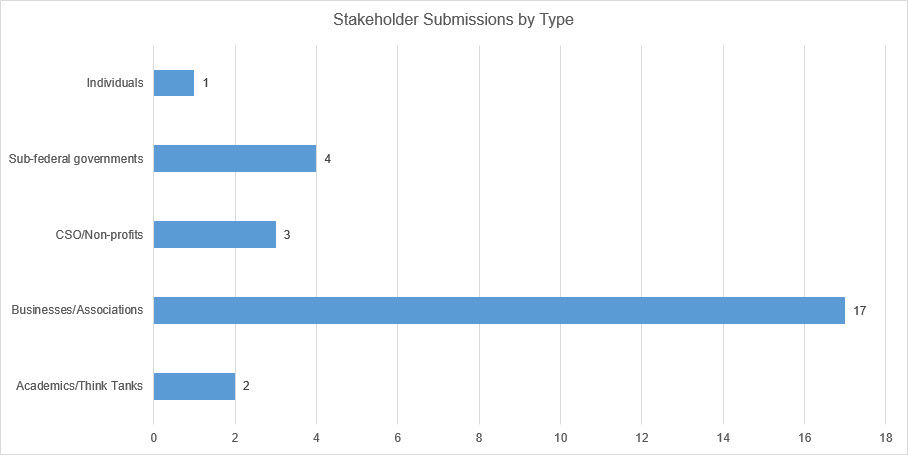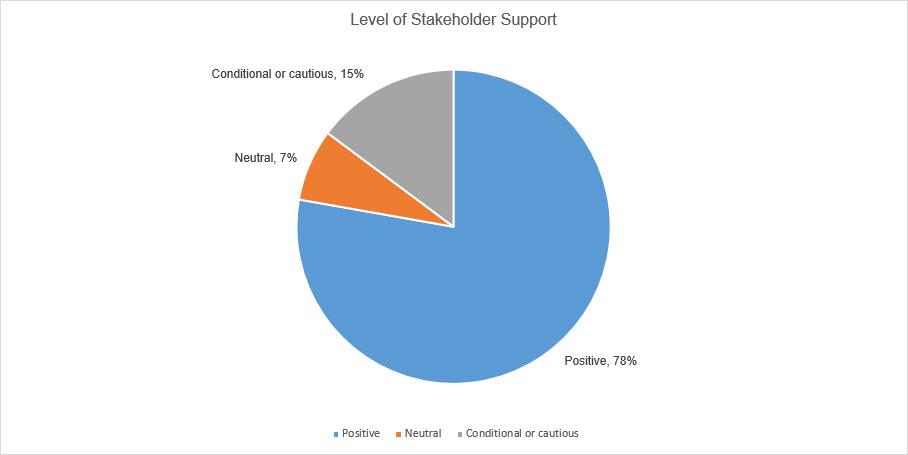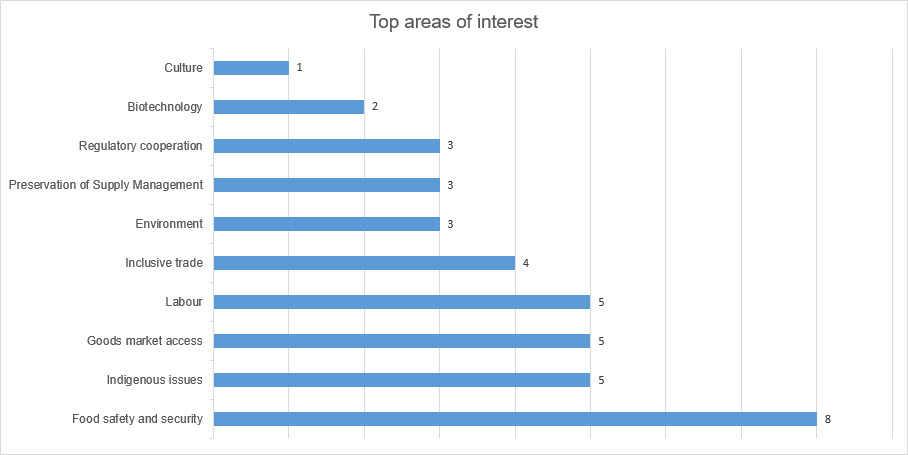Report: Public Consultations on the Americas Partnership for Economic Prosperity
On January 27, 2023, Mary Ng, Minister of International Trade, Export Promotion, Small Businesses and Economic Development, joined Antony Blinken, U.S. Secretary of State, Katherine Tai, U.S. Trade Representative, and representatives of the other participating countries, for the launch of the Americas Partnership for Economic Prosperity (APEP). The Partnership comprises 12 countries with common values and a shared vision for a prosperous and inclusive hemisphere: Barbados, Canada, Chile, Colombia, Costa Rica, Dominican Republic, Ecuador, Mexico, Panama, Peru, the United States, and Uruguay. In total, these countries represent approximately 90% of the Western Hemisphere’s GDP and nearly two thirds of its peoples. APEP is intended to be an open and inclusive initiative, and to expand in the future to include other partners that share the same vision, goals, and commitment to an ambitious agenda of sustainable economic growth and hemispheric resilience.
APEP is envisaged as an economic partnership and not expected to include tariff or market access commitments, unlike a traditional free trade agreement. A fully realized APEP would, however, deliver important outcomes to increase economic resilience, improve supply chains, harness the digital economy and raise environmental and labour standards.
APEP also seeks to promote democracy, human rights, gender equality and the rule of law, as well as to help combat climate change. These objectives are at the core of Canada’s foreign policy. Canada’s participation and leadership in the partnership will demonstrate our commitment to a progressive trade agenda, support Canada’s execution of its Feminist International Assistance Policy, reduce inequality, and promote an open, inclusive, and rules-based system across the region.
Canada is committed to collaborating with hemispheric partners to accelerate the region’s economic growth with the goal of supporting pandemic recovery, health, food and energy security, and the use of clean energy. We will work with other participating countries to help ensure that the benefits of the Partnership are broadly distributed to include historically under-represented groups, such as 2SLGBTQI+ individuals, Indigenous peoples, people with disabilities, seniors, visible minorities, women, and youth.
Summary of consultations
Global Affairs Canada conducted public consultations on priorities for the APEP negotiations from March 25 to May 9, 2023. These public consultations included a Canada Gazette notice, inviting written submissions, as well as targeted engagement with a variety of domestic stakeholders through virtual roundtable discussions, including with Indigenous groups and gender and trade advisors through Global Affairs Canada's ongoing consultative mechanisms.
Global Affairs Canada received 27 written submissions from Canadians across the country during the formal consultations period, including think tanks, businesses and business associations, civil society organizations and non-governmental organizations (NGOs), and sub-federal governments and agencies.
Figure 1. Written submissions received during public consultations, according to stakeholder type

Text version
| Stakeholder submissions by type | Written submissions received |
|---|---|
| Individuals | 1 |
| Sub-federal governments | 4 |
| CSO/Non-profits | 3 |
| Businesses/Associations | 17 |
| Academics/Think Tanks | 2 |
Additional submissions were received after the formal closure of the consultations period, but are not included in the total number of submissions received in this report. However, all those views submitted after the closure of consultations will be shared with Canadian trade negotiators and will contribute to informing Canada’s approach to APEP negotiations.
If you have questions or comments about this partnership, we would still like to hear from you. Please contact Global Affairs Canada at the following address: APEP-Consultations-PAPE@international.gc.ca
Americas Partnership for Economic Prosperity (APEP) Consultations
Global Affairs Canada
Trade Negotiations – North America (TNP) / Americas Branch (NDS)
John G. Diefenbaker Building
111 Sussex Drive
Ottawa, Ontario K1N 1J1
What we heard from stakeholders
Overall, stakeholders across a broad range of sectors indicated support for Canada’s engagement in APEP. They cited an interest in building on shared values as a means to foster economic integration and increase economic opportunity for Canadians. They also emphasised the importance of building and maintaining high labour and environmental standards among APEP countries.
Figure 2. Level of stakeholder support indicated in written submissions received during public consultations

Text version
| Level of stakeholder support | Written submissions received |
|---|---|
| Positive | 78% |
| Conditional or cautious | 15% |
| Neutral | 7% |
Stakeholders generally view APEP as an opportunity to build common labour, environmental and governance standards and to further integrate APEP economies. Stakeholders see the potential for APEP to contribute to sustainable and inclusive growth and supply chain resilience. The priorities presented in the Joint Declaration released by all participating countries on January 27, 2023,were well received by interested groups, including priorities regarding gender equity, human development and transparency.
A number of private sector stakeholders suggested the government should pursue market access commitments among APEP countries and further pursue free trade agreements with countries across the Americas. Another group wanted to ensure market access in certain sectors would be maintained at current levels. Additionally, various stakeholders identified the need to ensure that outcomes focused on equitable policies including those that ensure the benefits of trade are shared by all, and the interests and voices of marginalized groups are reflected within the agreement.
Figure 3. Top areas of interest identified in written submissions received during public consultations

Text version
| Top areas of interest | Written submissions received |
|---|---|
| Culture | 1 |
| Biotechnology | 2 |
| Regulatory cooperation | 3 |
| Preservation of supply management | 3 |
| Environment | 3 |
| Inclusive trade | 4 |
| Labour | 5 |
| Goods market access | 5 |
| Indigenous issues | 5 |
| Food safety and security | 8 |
Views of Canadian businesses
We heard from Canadian businesses and business associations from the following sectors:
- agriculture and agri-food;
- textiles;
- digital economy; and,
- services.
In general, businesses indicated support for the establishment of trade rules and procedures that cut red tape and help level the competitive playing field. Businesses and associations support an agreement that would improve economic resilience, diversify supply chains, lower costs, harness the digital economy, and improve environmental and labour standards.
Agriculture and agri-food
The government received a total of 7 submissions from business associations and 1 submission from a company in the agriculture and agri-food sector.
Agri-food stakeholders in export-oriented sectors (for example, cereals and produce) view APEP as an important opportunity to secure rules that facilitate trade, and to address non-tariff barriers that continue to hinder Canadian exports, especially concerning sanitary and phytosanitary (SPS) measures. The highest priority for the majority of these agri-food stakeholders are commitments that require regulatory measures for food safety and animal and plant health be science-based, transparent, harmonized with international standards, and not applied in a manner that creates unnecessary barriers to trade.
Agri-food stakeholders from supply-managed sectors (for example, dairy and poultry) emphasized the importance of not expanding upon the current levels of access to the Canadian market for these products. These stakeholders indicated that they are not opposed to moving forward on APEP negotiations, but insisted that Canada refrain from making any further market access concessions for supply managed products and ensure that any access be limited to already-established volumes provided for in existing agreements.
Numerous submissions noted that approval processes and regulatory regimes often differ across jurisdictions, which can cause unnecessary trade disruptions and slow agri-food innovation (for example, crop protection products and products of biotechnology). Stakeholders across a range of agricultural sectors called for Canada to work with APEP countries to support and reinforce regulatory frameworks that are based on science and internationally accepted risk assessment principles. Likewise, regarding biotechnology, stakeholders recommended that commitments on predictable, timely, transparent and science-based approval processes form a baseline for discussions.
Textiles
We heard from one textile business association and one textile business, both of which underscored that market access arrangements are their top priority, but welcomed commitments that work towards the harmonization of environmental, social, and governance (ESG) standards across APEP countries. Textile stakeholders value commitments on customs procedures, trade facilitation, logistics, good regulatory practices, and non-tariff barriers, but emphasize that APEP should act as a step towards preferential market access arrangements.
Digital economy and services
Professional service providers and digital economy associations indicated that they would value APEP as a way to deepen economic cooperation and commercial ties throughout the hemisphere. This is critically important to the growth and competitiveness of North American services firms, which are increasingly focussed on digital delivery.
Services and digital economy associations suggested that lowering trade costs and red tape at the border through the adoption of digital tools, and the adoption of good regulatory practices based on the Canada-United States-Mexico Agreement (CUSMA, also known as USMCA and T-MEC) provisions, would be an important part of any agreement. They also suggested that binding, enforceable rules that create stability and predictability regarding data flows would be crucial to promoting digital connectivity. They underscored the need to work toward inclusive prosperity, especially among SMEs and Indigenous peoples and communities.
Views on labour rights
Many submissions from the private sector and non-profit stakeholders highlighted labour rights and standards as a priority issue. Private sector associations underscored the importance of ending forced labour. Non-profit stakeholders called for the adoption of International Labour Organization conventions on domestic work and on violence and harassment in the workplace, and called on Canada to ensure fully enforceable provisions on labour rights.
Think tanks urged Canada to build upon the provisions found in CUSMA’s labour chapter as a baseline and to expand across APEP countries the CUSMA rapid response labour mechanism. In addition to the think-tanks, the union we heard from stressed that all provisions should create “fair trade”, reflect the interests of workers, and not undermine Canada's ability to implement regulations intended to protect workers, citizens and the environment.
Views on the environment
A range of stakeholders raised environment and climate change considerations, including think-tanks, civil society organizations, provinces and territories. Think-tanks stressed that APEP should incorporate enforceable environment commitments, including binding commitments to combat climate change and implement international climate obligations. Other stakeholders encouraged the government to pursue trade rules that support environmental standards.
Horizontal considerations
A number of stakeholders urged Canada to advance an inclusive approach to trade and opportunities for SMEs, women, Indigenous People(s), and racialized communities. Several submissions called for including or “mainstreaming” gender provisions across the entire agreement.
Stakeholders from all sectors raised the importance of transparency throughout the negotiations, and several asked to be kept informed as negotiations continue.
Two think-tanks called on Canada to not include an investor-state dispute settlement mechanism in APEP.
We also heard from a Canadian cultural industries organization which suggested APEP adopt the exception for cultural industries from CUSMA.
Indigenous peoples
We heard support across stakeholder groups for a general exception for the rights of Indigenous peoples, as well as carve-outs and special provisions to promote opportunities for Indigenous businesses in the partnership.
Sub-federal governments
Five sub-federal or municipal governments prepared substantive submissions. Submissions recognized the importance of standards and initiative-based agreements, and welcomed opportunities to:
- deepen the economic integration within the hemisphere;
- attract investment;
- facilitate technology and services trade; and
- bolster and diversify supply chains.
Overall, these submissions supported an inclusive approach to trade agreements, citing the importance of commitments on gender, small- and medium-sized enterprises, and Indigenous people(s). We also received a recommendation to secure exceptions for Indigenous peoples based on those in CUSMA, and to support Indigenous communities to develop international markets for Indigenous-produced goods.
Provinces and territories suggested Canada focus on ensuring that APEP works to level the playing field and reduce non-tariff barriers to trade. They also noted the need for greater regulatory convergence in key areas such as agri-food. Some submissions highlighted emerging industries that should be taken into account during the negotiations, including:
- the blue economy;
- digital trade;
- critical minerals and mining; and
- advanced technologies.
Some provinces and territories emphasized the importance of ensuring that key reservations and exceptions are protected in a bilateral agreement, such as the right to regulate in the public interest.
Next steps
The Government of Canada is committed to consulting and engaging with Canadians and key stakeholders throughout the process. The feedback received from stakeholders will help define Canada's interests and priorities during negotiations.
- Date modified: